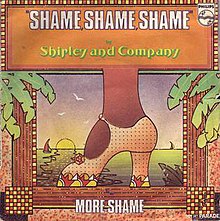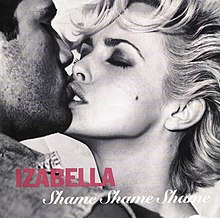
"I Will Survive" is a song by American singer Gloria Gaynor, released in October 1978 as the second single from her sixth album, Love Tracks (1978). It was written by Freddie Perren and Dino Fekaris. The song's lyrics describe the narrator's discovery of personal strength following an initially devastating breakup. The song is also frequently recalled as a symbol of female empowerment, as well as a disco staple.

"Never Can Say Goodbye" is a song written by Clifton Davis and originally recorded by the Jackson 5. The song was originally written and intended for the Supremes; however, Motown decided it would be better for the Jackson 5. It was the first single released from the group's 1971 album Maybe Tomorrow, and was one of the group's most successful records. It has been covered numerous times, most notably in 1974 by Gloria Gaynor and in 1987 by British pop group the Communards.
Shirley & Company was an American disco group, consisting of Shirley Goodman (1936–2005), Jason Alvarez, Walter Morris, Bernadette Randle, Seldon Powell, Jonathan Williams, Kenny Jeremiah, and Clarence Oliver.

"Jive Talkin'" is a song by the Bee Gees, released as a single in May 1975 by RSO Records. This was the lead single from the album Main Course and hit number one on the Billboard Hot 100; it also reached the top-five on the UK Singles Chart in the middle of 1975. Largely recognised as the group's comeback song, it was their first US top-10 hit since "How Can You Mend a Broken Heart" (1971).

"I'm Every Woman" is a song by American singer Chaka Khan, released as her debut solo single from her first album, Chaka (1978). It was Khan's first hit outside her recordings with the funk band Rufus. "I'm Every Woman" was produced by Arif Mardin and written by the successful songwriting team Nickolas Ashford and Valerie Simpson. The single established Chaka's career outside the group Rufus, whom she would leave after their eighth studio album, Masterjam, was released in late 1979.

"December, 1963 " is a song originally performed by the Four Seasons, written by original Four Seasons keyboard player Bob Gaudio and his future wife Judy Parker, produced by Gaudio, and included on the group's album Who Loves You (1975).

"Could It Be Magic" is a song written by Adrienne Anderson and composed by Barry Manilow, inspired by Frédéric Chopin's Prelude in C minor, Opus 28, Number 20.

The discography of American rhythm and blues singer Diana Ross, the former lead singer of the Supremes, consists of 26 studio albums and 116 singles. Throughout her career, Ross has sold over 100 million records worldwide. Billboard ranked her as the 47th Greatest Artist of all time and the 11th Greatest Hot 100 Female Artist of all time. In 1993, Guinness World Records crowned Ross as the "most successful female artist in music history". Her 11th studio album "Diana" remains the best-selling album of her career, selling more than 10 million copies and album equivalent units around the world.
"Don't Leave Me This Way" is a song written by Kenneth Gamble, Leon Huff and Cary Gilbert. It was originally released in 1975 by Harold Melvin & the Blue Notes featuring Teddy Pendergrass, an act signed to Gamble & Huff's Philadelphia International label. "Don't Leave Me This Way" was subsequently covered by American singer Thelma Houston in 1976 and British duo the Communards in 1986, with both versions achieving commercial success.
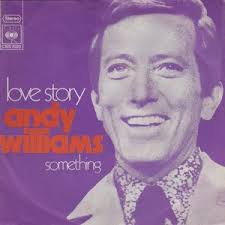
"(Where Do I Begin?) Love Story" is a popular song published in 1970, with music by Francis Lai and lyrics by Carl Sigman. The song was first introduced as an instrumental theme in the 1970 film Love Story after the film's distributor, Paramount Pictures, rejected the first set of lyrics that were written. Andy Williams eventually recorded the new lyrics and took the song to number nine on Billboard magazine's Hot 100 and number one on their Easy Listening chart.

"Rock Your Baby" is the debut single by American singer George McCrae. Written and produced by Harry Wayne Casey and Richard Finch of KC and the Sunshine Band, "Rock Your Baby" was one of the landmark recordings of early disco music. A massive international hit, the song reached number one on the Hot 100 in the United States, spending two weeks there in July 1974; number one on the R&B chart; and number one on the UK Singles Chart, spending three weeks at the top in July 1974. Having sold 11 million copies, it is one of fewer than 40 all-time singles to have sold 10 million physical copies worldwide.
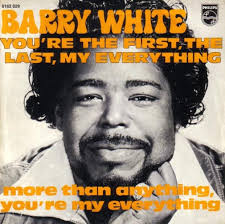
"You're the First, the Last, My Everything" is a song recorded by American singer and songwriter Barry White from his third studio album, Can't Get Enough (1974). The song was written by White, Tony Sepe and Peter Radcliffe and produced by White. It reached number two on the US Billboard Hot 100 and number one on the UK Singles Chart. The song was certified Gold by the Recording Industry Association of America (RIAA) in 1974, and certified silver by the British Phonographic Industry (BPI), also in 1974.

"Fly, Robin, Fly" is a song by the German disco group Silver Convention from their debut studio album Save Me (1975). Sylvester Levay and Stephan Prager wrote the song, and the latter produced it. "Fly, Robin, Fly" was released as the third single from Save Me in September 1975, reaching number one on the United States Billboard Hot 100. Thanks to the success of "Fly, Robin, Fly", Silver Convention became the second German act to have a number one song on the American music charts. The song received a Grammy Award for Best R&B Instrumental Performance in 1976.
Belle Epoque was the name of a female vocal trio, based in Paris, France. The group first rose to popularity during the late 1970s with a disco remake of the song "Black Is Black", originally a hit in 1966 for the Spanish group Los Bravos.

"Forever Came Today" is a 1968 song written and produced by the Motown collective of Holland–Dozier–Holland, and was first made into a hit as a single for Diana Ross & the Supremes in early 1968. A disco version of the song was released as a single seven years later by Motown group the Jackson 5.

"Love Is in the Air" is a 1977 disco song by Australian singer John Paul Young. It was written by George Young and Harry Vanda, and released as the lead single from Young's fourth studio album, Love Is in the Air (1978). The song became a worldwide hit in 1978, peaking at No. 3 on the Australian charts and No. 5 on the UK Singles Chart. In the United States, it peaked at No. 7 on the pop chart and spent two weeks at No. 1 on the Adult Contemporary chart, his only U.S. top 40 hit. The song plays at 122 beats per minute, a typical 1970s disco rhythm. At the Australian 1978 King of Pop Awards, the song won Most Popular Australian Single. In 1992, a remix of the song was released and featured on the soundtrack to the Golden Globe-nominated film Strictly Ballroom. A new music video was also produced.

"Funkin' for Jamaica (N.Y.)" is a song by jazz trumpeter Tom Browne. The single—a memoir of the Jamaica neighborhood in the New York City borough of Queens where Browne was born and raised—is from his second solo album, Love Approach. Browne got the idea for the song while he was at his parents' home. The vocals for the single were performed by Toni Smith, who also helped compose the song. The song hit number one on the US Billboard R&B chart for a month. "Funkin' for Jamaica" peaked at number nine on the dance chart and made the top 10 on the UK Singles Chart, but it never charted on the Billboard Hot 100.

"Black Is Black" is a song by the Spanish rock band Los Bravos, released in 1966 as the group's debut single for Decca Records. Produced by Ivor Raymonde, it reached number two in the UK, number four in the US, and number one in Canada. With the recording's success, Los Bravos became the first Spanish rock band to have an international hit single. A dance remix was released as a single in 1986.

Smooth Talk is the debut album, released in 1977 by R&B singer Evelyn "Champagne" King by RCA Records and produced by Theodore Life. It contains singles "Shame", also one of King's signature songs, and "I Don't Know If It's Right", both of which were hits in the United States and Canada. Outside North America in music charts, "Shame" performed modestly in a few European countries, while the latter performed poorly in British and New Zealand charts.
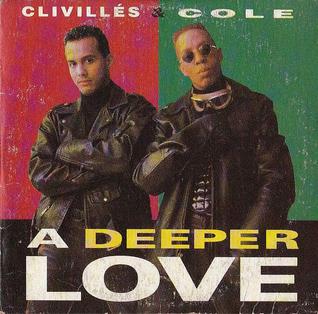
"A Deeper Love" is a song written by American producers Robert Clivillés and David Cole, and performed by them as Clivillés & Cole featuring vocals by Deborah Cooper. Released by Columbia in 1991, the song was the duo's fifth number-one on the US Billboard Hot Dance Club Play chart. On other US charts, "A Deeper Love" peaked at number 83 on the soul singles chart and number 44 on the pop chart. Overseas, especially in Europe the single charted higher, going to number 15 in the UK and number eight on the Dutch Top 40.
